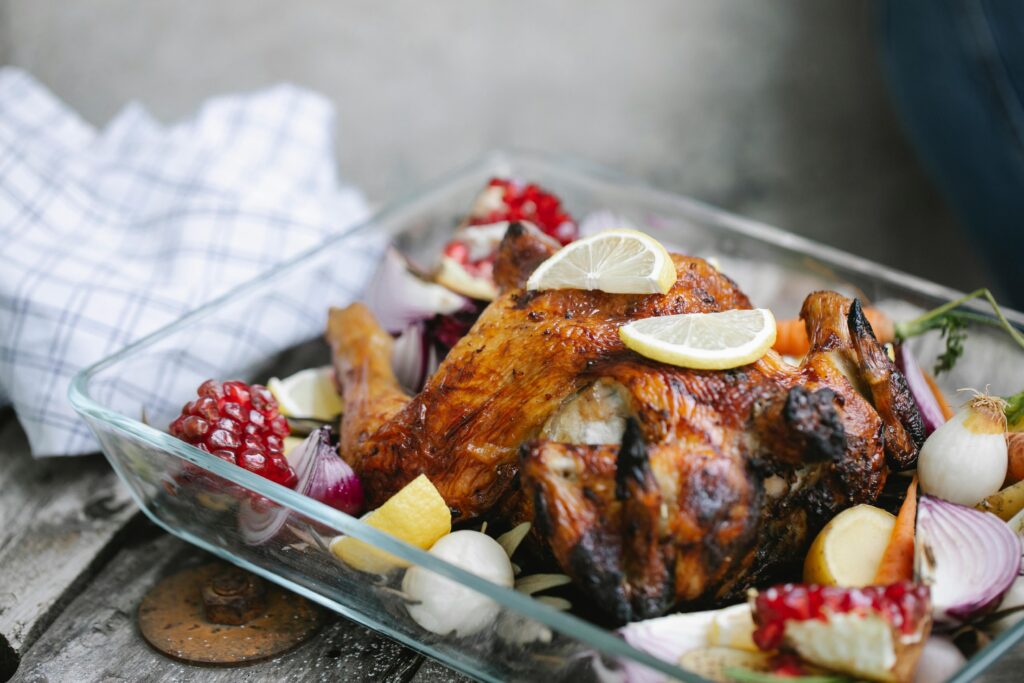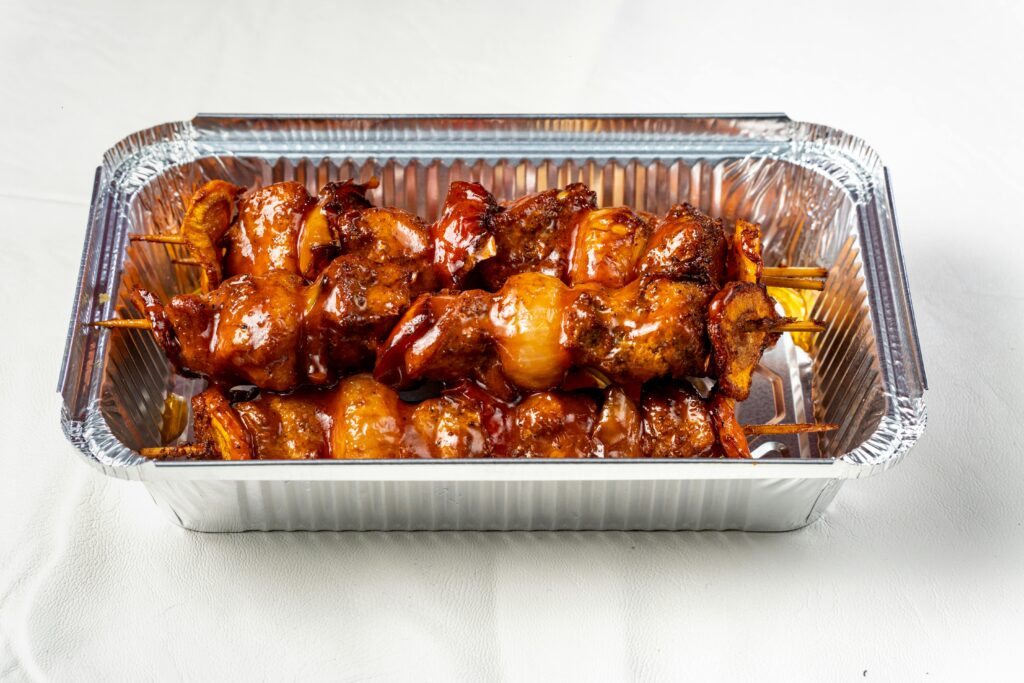Israel being a multicultural nation, the food served around Christmas in Israel varies based on the area and the community’s cultural background. Although there isn’t a large Christian community in Israel, some do celebrate Christmas with different types of festive foods.
Nonetheless, there are a few popular Christmas foods and customs in Israel, especially among the Christian populations. Since Christmas isn’t a prominent celebration in Israel, as many of them aren’t Christians, the traditional dishes you might associate with Christmas elsewhere won’t be as frequent in Israel.
A small Christian population does celebrate Christmas, and their meals may incorporate both foreign and indigenous flavors. What would be on an Israeli Christmas table? Let’s discuss below:
Israel Christmas Food
1. Stuffed Turkey or Chicken

One key food to see in Israel’s table as part of the Christmas foods is stuffed turkey or chicken. A traditional focal point for many Christmas feasts in Israel is roast turkey or chicken stuffed with a savory blend of rice, nuts, dried fruits and spices. Typically, mashed potatoes, roasted veggies, and gravy go with this dish. As many countries celebrate Christmas with roasted, stuffed turkeys, some Christian households in Israel also serve this delicacy.
2. Maqluba

This is one of the Christmas foods consumed in Israel. A classic Palestinian dish, it’s a favorite among Israel’s Arab Christian community. Maqluba, which translates to “upside-down” from Arabic, is a one-pot meal that is prepared with layers of rice, meat (such as lamb or chicken) and vegetables (including eggplant, cauliflower, and carrots). Everything is cooked together and then turned upside down for serving.
3. Kahk
Kahk biscuits are a traditional Christmas treat in several Middle Eastern nations, including Israel. These cookies can be filled with dates or nuts and are often baked using flour, butter, sugar and spices like nutmeg and cinnamon. Typically, kahk are served during Christmas festivities as a sweet dessert.
4. Kebabs

In Israel, grilled meat skewers, such lamb or chicken kebabs, are a popular treat at Christmas parties. Rice, pita bread and a selection of salads and dips, like tahini and hummus, are frequently served alongside these succulent and savory kebabs.
5. Fruit Salad
In Israel, a light and healthful dessert choice during the Christmas season is typically a refreshing fruit salad made with a variety of seasonal fruits, like oranges, pomegranates, and grapes.
6. Baklava

Baklava is a popular delicacy in many Middle Eastern nations, including Israel. It is a rich and delicious pastry constructed with layers of phyllo dough, almonds, and honey or syrup. It is frequently savored on festive times like Christmas.
7. Warmed Wine
Although it is not customarily Israeli, mulled wine has gained popularity in Israel as a celebratory beverage for Christmas. Red wine is heated with spices like cloves, cinnamon, and citrus fruits to create this warm, spiced wine, which is popular with both locals and visitors during the holidays.
8. Lamb
Roasted lamb meals are a local favorite and could be the main entrée of an Israeli Christmas dinner. Examples are Malfouf, which is filled cabbage leaves with minced lamb and rice and Qidreh, which is lamb and rice cooked in a wood-fired oven. Roasted lamb is a major protein in the area and is featured heavily.
9. Vegetables and Grains
A lot of fresh vegetables and whole grains are used in Israeli Christmas food. The main meal could be served with salads, couscous, or roasted vegetables.
10. Sweets/Candies
Another food served during Christmas in Israel is sweets and candies. For dessert, you might have cakes, candy, and Christmas cookies. There might be some influence from European Christmas traditions here, given that items like stollen, a German fruit bread and panettone, an Italian dessert, are also available.
Has The Availability Of Christmas Foods Changed In Israel With Time?
Yes, the availability of Christmas foods in Israel has changed with time for so many reasons. It’s true that Christmas meals aren’t as readily available in Israel these days, but it’s vital to keep in mind that the country doesn’t celebrate Christmas as a big holiday. Below is a summary of some possible changes:
1. Limited Christmas Food Scene
Traditionally, there wouldn’t have been a large demand for typical Christmas food items because of the lower Christian population in Israel. Certain Christmas sweets or imported ingredients might have been more difficult to locate.
2. Evolving Christian Communities and Globalization
Over time, Israel’s Christian community has expanded. This could result in the following, combined with more globalization:
More Demand: A greater number of Christians could lead to a greater demand for Christmas food products.
Improved Availability: As the holiday season approaches, supermarkets and specialized shops may begin to offer pre-made Christmas delicacies or imported ingredients in response to this demand.
Restaurant Options: Traditional Christmas meals may be offered by more restaurants that target Christian communities.
3. Local Adaptation and Fusion
Israeli Christmas feasts may nevertheless feature a fusion of regional and foreign flavors, despite the greater accessibility of traditional holiday fare. One could combine regional foods and cooking techniques into Christmas meal preparation.
4. Difficulties and Points to Consider
Since Christmas isn’t a national holiday in Israel, there may not be as much commercialization of the holiday’s foods as there is in other nations. Hanukkah, a Jewish holiday, usually occurs in December. In contrast to regions where Christmas is the main December holiday, this can lessen the emphasis on Christmas food, where Christmas is the primary December holiday.
Having said all these, globalization and a larger Christian population have probably contributed to an increase in the availability of Christmas foods in Israel. It’s still not as accessible, though, as it is in nations with more Christmas customs and practices. The Hanukkah celebrations and local modifications may also have an impact on the Christmas foods in Israel.
Do Israeli families Have Any Specific Customs Or Rituals Related To Preparing Christmas foods?
Due to the lesser scope of Christmas celebrations in Israel, information regarding specific customs and rituals surrounding the preparation of Christmas foods in Christian families may be restricted. However, here are some possibilities:
Potential Customs and Rituals:
- Family Gathering: Organizing the Christmas dinner may be a time for families to get together, exchange gifts and strengthen their bonds, much like Christmas customs in other countries.
- Incorporation of Local Traditions: Families may use Israeli culinary traditions in the preparation of their Christmas dinner. This could entail serving classic Christmas recipes with regional herbs, spices and cooking techniques.
- Influence of Hanukkah: There may be some overlap in customs because Hanukkah happens around December. Christmas meal preparation could include elements like lighting the menorah or indulging in Hanukkah sweets like sufganiyot (jelly doughnuts).
- Passing Down Traditions: To ensure that Christmas feast customs continue, older family members may pass down recipes and cooking methods to younger generations.
Challenges and Considerations
- Limited Documentation: Compared to nations with a lengthy history of Christmas traditions, Israel may celebrate Christmas on a lesser scale, meaning that there may be less recorded knowledge on particular customs and rituals.
- Differences Between Families: Every family has its own traditions for celebrating Christmas, and this includes cooking the food. Certain families may have incorporated traditions from their own Christian religion or cultural background.
Finding More Information:
- Reaching out to Local Communities: Establishing relationships with Christian communities or organizations in Israel may offer insights into their unique traditions around the preparation of Christmas foods..
- Examining Historical Influences: Examining the Christian customs of immigrants to Israel may provide insight into possible influences on the traditions surrounding the preparation of the Christmas dinner.
Even though there may not be a comprehensive collection of recorded traditions, it is reasonable to presume that cooking the Christmas food for Christian families in Israel is important for strengthening family ties and passing down traditions, perhaps with a distinctively Israeli twist, as Christmas is not a widely observed holiday in Israel. Small Christmas markets with classic European Christmas foods may exist in some areas with a higher number of Christians, such as Jerusalem.
Hanukkah is observed by most people; it falls in December but has a different date every year. You may need to seek out eateries that specialize in serving Christian populations if you’re interested in having a typical Israeli Christmas lunch. There are mouthwatering selections, including braised brisket, sufganiyot (jelly doughnuts), and potato latkes (fried potato pancakes).These foods with a Christmas theme might be found in private home celebrations or in establishments that cater exclusively to Christian communities.
Conclusion
In summary, the above discussions and explanations are just a few examples of the many different types of food that are available in Israel for Christmas. Certain foods and customs may differ based on cultural background, family customs, and individual tastes, among other things.
To access these foods easily,.one can also look for restaurants catering to Christian communities or explore the delicious world of Hanukkah dishes for a festive Israeli December experience. We should also not forget that markets and street vendors play massive roles in providing Christmas food in Israel which makes the festive period very fulfilling, interesting and unique.


